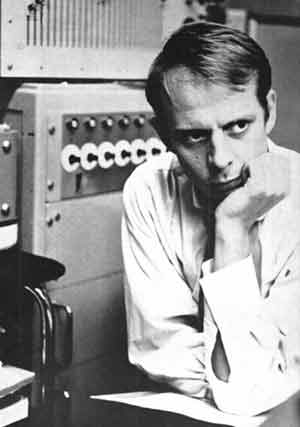 Lenin once described socialism as workers power and democracy + the electrification of the countryside. Karlheinz Stockhausen was a groundbreaking composer-philosopher of the 20th Century who used electricity to weave some of the most compelling and militant avant-garde sounds of the last 100 years and now the man is dead.
Lenin once described socialism as workers power and democracy + the electrification of the countryside. Karlheinz Stockhausen was a groundbreaking composer-philosopher of the 20th Century who used electricity to weave some of the most compelling and militant avant-garde sounds of the last 100 years and now the man is dead.At one time, Stockhausen was named-checked by every Kraftwerk and Bjork listening pseudo-musical intellectual. For me, his electronic collages were the musical counterpart to TS Eliot's "The Wasteland" sketching out a landscape of modern distintergration that surrounded me.
Growing up in a council estate in a small market town meant that visionary and transcendental experience was sought outside of my own limited world of adolescence. Picking up a vox guitar and jacking it into an amplifier I would make weird sounds and try and reach out for something more in life. The screaming howl of feedback mirrored the scream of adolescent rage with a world gone wrong. An idealist I wanted genuine communion with the people and world around me, not experience mediated through some corporate product.
I discovered Stockhausen at around the same time as I hit upon one of his mentors, the brilliant Messaien. Messaien was a maverick French organ player who would construct huge gothic architecture in cathedrals around themes like the fire of Pentacost or the Ressurection of the dead . . . powerful stuff.
Like many young musicians I had my "secret heroes". Stockhausen was someone who taught me to be serious about the gaps in music, he had a concept of "coloured silence" that was incredibly useful. Another pioneer, Arvo Part once said, "that a single note played beautifully could me more important than a symphony" - I went on a quest to find that single note.
Stockhausen advocated a complete rejection of the entire canon of classical music. While such nihilism is ultimately futile and leads to a music that cannot connect to a mass audience it expanded the palate of many a musician and was another arrow in the quiver to use when times got tough.
Stockhausen's reasoning was poignant: He grew up in a world where Beethoven was what SS stormtroopers would listen to for relaxation after closing the oven doors on Jewish families. Classical music became the soundtrack for barbarism.
His father had been an enthusiastic National Socialist who went missing in the brutal war on the Eastern Front. His mother was one of many women forced into an asylum and fell victim to the Nazi's perverted science dying in their euthanasia programme.
Stockhausen described hearing the marching songs of war on the radio-set all through his childhood this scarred him with a lifelong hatred of repetitive, regular rhythms and pushed him out of the black and into the blue.
Whether Stockhausen was a political revolutionary is not important here. The militant socialist composer and one time musical collaborator, Cornelius Cardew, thought not and denounced him. What IS important was that Stockhausen was a musical revolutionary. Like the Kama Sutra his work is more of a manual or textbook than artwork in its own right.
Ultimately, Stockhausen's music was ugly. But as another musical prophet said, "The only beauty's Ugly, man". As a musician I'm still trading on the stamps that Stockhausen gave to me in my youth.
Goodbye, Comrade Stockhausen!















No comments:
Post a Comment